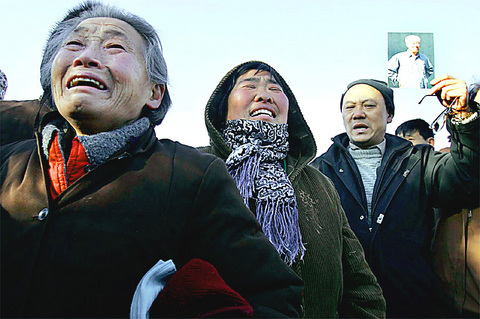The family of deposed Chinese leader Zhao Ziyang (
Zhao was purged and kept under house arrest for 15-and-a-half years until his death for opposing the bloody military crackdown on the 1989 Tiananmen Square protesters. But even in death, he was unfree.

PHOTO: AFP
Hundreds of uniformed and plainclothes police guarded the Babaoshan Revolutionary Cemetery Saturday, and kept out hundreds of people who turned up to pay their last respects to the man who had been China's premier and Communist Party chief.
Zhao's closest relatives said they had little say in the funeral that the Chinese authorities insisted on organizing and were upset by the government's interference in matters that should normally have been left up to the family.
There was a news blackout ahead of the funeral. The government censored the funeral guest list and blocked people -- including many who were invited by the family -- from attending the funeral.
Bao Tong, Zhao's closest aide, and other dissidents were banned from leaving home to attend the funeral as the government sought to keep the ceremony low-key to prevent it becoming a rallying point for those dissatisfied with the Communist Party.
Elderly protestors and ordinary citizens turned up outside the cemetery, but were turned away. Wearing white headbands, petitioners held pictures of Zhao and cried bitterly for the leader they called "a good man." Family members were not allowed to decorate the funeral hall and were forbidden from putting up traditional calligraphy scrolls of eulogies for the deceased.
"Advocating democracy and conscience, your family is proud of you. You are gone, you are free at last, but your spirit will live on forever," one couplet had said.
A family member said Zhao never regretted his decision to oppose the bloody crackdown on the Tiananmen pro-democracy movement. He was purged for "supporting the turmoil and splitting the party" by taking a sympathetic stance towards the students. His last public appearance was on May 19, 1989, when he tearfully begged students to end their hunger strike.
"He never regretted his choice. He left in peace and he had no regrets," she said. "We were often angry about lots of things on his behalf, but he was always very calm."

Tens of thousands of Filipino Catholics yesterday twirled white cloths and chanted “Viva, viva,” as a centuries-old statue of Jesus Christ was paraded through the streets of Manila in the nation’s biggest annual religious event. The day-long procession began before dawn, with barefoot volunteers pulling the heavy carriage through narrow streets where the devout waited in hopes of touching the icon, believed to hold miraculous powers. Thousands of police were deployed to manage crowds that officials believe could number in the millions by the time the statue reaches its home in central Manila’s Quiapo church around midnight. More than 800 people had sought

DENIAL: Pyongyang said a South Korean drone filmed unspecified areas in a North Korean border town, but Seoul said it did not operate drones on the dates it cited North Korea’s military accused South Korea of flying drones across the border between the nations this week, yesterday warning that the South would face consequences for its “unpardonable hysteria.” Seoul quickly denied the accusation, but the development is likely to further dim prospects for its efforts to restore ties with Pyongyang. North Korean forces used special electronic warfare assets on Sunday to bring down a South Korean drone flying over North Korea’s border town. The drone was equipped with two cameras that filmed unspecified areas, the General Staff of the North Korean People’s Army said in a statement. South Korea infiltrated another drone

COMMUNIST ALIGNMENT: To Lam wants to combine party chief and state presidency roles, with the decision resting on the election of 200 new party delegates next week Communist Party of Vietnam General Secretary To Lam is seeking to combine his party role with the state presidency, officials said, in a move that would align Vietnam’s political structure more closely to China’s, where President Xi Jinping (習近平) heads the party and state. Next week about 1,600 delegates are to gather in Hanoi to commence a week-long communist party congress, held every five years to select new leaders and set policy goals for the single-party state. Lam, 68, bade for both top positions at a party meeting last month, seeking initial party approval ahead of the congress, three people briefed by

Cambodia’s government on Wednesday said that it had arrested and extradited to China a tycoon who has been accused of running a huge online scam operation. The Cambodian Ministry of the Interior said that Prince Holding Group chairman Chen Zhi (陳志) and two other Chinese citizens were arrested and extradited on Tuesday at the request of Chinese authorities. Chen formerly had dual nationality, but his Cambodian citizenship was revoked last month, the ministry said. US prosecutors in October last year brought conspiracy charges against Chen, alleging that he had been the mastermind behind a multinational cyberfraud network, used his other businesses to launder